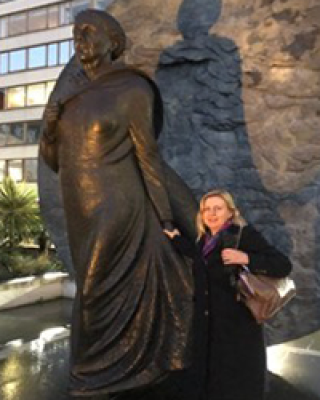Blog written by Carolyn Spring, Research Educator, Centre for Nurse, Midwife and Allied Professional Research (CNMAR)
Looking back, the seeds of my clinical academic career were planted early in 2016. I was working as a trauma and orthopaedic nurse and following a traumatic patient outcome, I became interested in embolism risk management strategies. I applied in 2017 for a part time post at Imperial College Healthcare NHS Trust to explore patient and staff experiences of using anti embolism stockings. This small grant project sparked my interest in doing further research. I was a complete novice. I remember confidently purchasing the Oxford Handbook for Qualitative Research with the intention that I would find out how to be an effective researcher.
In 2019, I achieved a Mary Seacole Foundation Award to explore the experiences of minority ethnic nursing associates in an NHS acute Trust. Encouraged by my supervisors, I applied for an Imperial Healthcare Charity/NIHR BRC Imperial pre doctoral award to conduct a larger study in 2020/1 to investigate the views and experiences registered nurses, healthcare assistants and post holders, of the nursing associate role in practice.

As the pandemic hit, I had commenced a part time role in the CNMAR at UCLH. This involved supporting clinically research active healthcare professionals outside of medicine in undertaking research internships and fellowships. These professionals would experience significant disruption and challenges prior to taking forward their projects to successful completion.
The interviews with nursing associates during the second wave of the pandemic brought into sharp focus the power dynamics underpinning the evidence base for healthcare; dynamics influencing what is researched, by whom and the parameters of inclusion. I realised that to understand how disadvantage and discrimination is enabled and reproduced in healthcare requires an intersectional lens, reflexivity and awareness of individual agency.
COVID-19 spotlighted the inequalities and differential risks impacting healthcare communities and laid bare the ethnocentrism and exclusion of minority ethnic communities in the evidence base. The momentum of the Black Lives Matter Movement increased awareness of these differentials and added to the clamour for quality, diversity and inclusion in care and research.
Nursing workforce professionals in both of my awarded studies were exposed to enormous challenges, traumas and dangers. It was increasingly apparent that minority ethnic communities and healthcare professionals faced disproportionate morbidity and mortality risks. Interviews with nursing associates provided stark accounts of risk exposure, racism, mental anguish and working beyond role boundaries to meet unmet needs. My research now incorporated a trauma protocol to address this change.
Whilst my learning journey, and those of my NMAHP-P-HCS research peers at UCLH and Imperial College Hospital NHS Trust were significantly altered by the COVID-19 pandemic, the emotional and practical challenges brought a reframing of ideas and priorities. Our shared learning experiences informed a sense of a research community – vital to establishing an identity for research outside of medicine. Connect Journal and the CNMAR monthly newsletter reinforced and promoted this ‘space’, allowing for both the celebration of new research and an informed critique of the inadequacies within the evidence base.
The CNMAR adapted quickly to embrace the learning that arose in response to the significant political, social and societal disruption and the impact on healthcare. Connect Issue 13, our peer reviewed academic journal for healthcare professional research outside of medicine, focused on equality, diversity and inclusion, situating relevant frontline academic outputs within a narrative to address the need for a broader evidence base for care and professional wellbeing.
Reflexivity was also interlaced in the evaluation of the CNMAR internship programmes to support clinical academic careers. Focus resumed on a study to explore the outcomes of a CNMAR fellowship programme to backfill two days a week of fellow’s time for up to a year, to give them time to make competitive applications to the NIHR.
The analysis found the main benefits of participating in the programme were protected time for research, opportunities to develop collaborations, increasing intra- and inter-professional awareness research outside of medicine, peer-reviewed publications, and conference presentations. Challenges included a lack of support from line managers, limited value placed on non-medical research and failure to backfill posts.
This work adds to the growing clamour to develop effective organisational practices and systems within healthcare organisations and higher education institutions to take forward clinical academic careers. To view the paper summary please click: Spring C, Hogg J, Holliday J et al (2023) Using the making Visible the ImpaCT Of Research (VICTOR) questionnaire to evaluate the benefits of a fellowship programme for nurses, midwives and allied health professionals. Nurse Researcher. doi: 10.7748/nr.2023.e1864.
Although we cannot see around corners, or anticipate the full impact of global megatrends, my clinical academic journey to date has allowed for a better understanding of the need to champion the benefits of frontline research to support broader participation in research to build a more inclusive and representative evidence base.
 Close
Close

